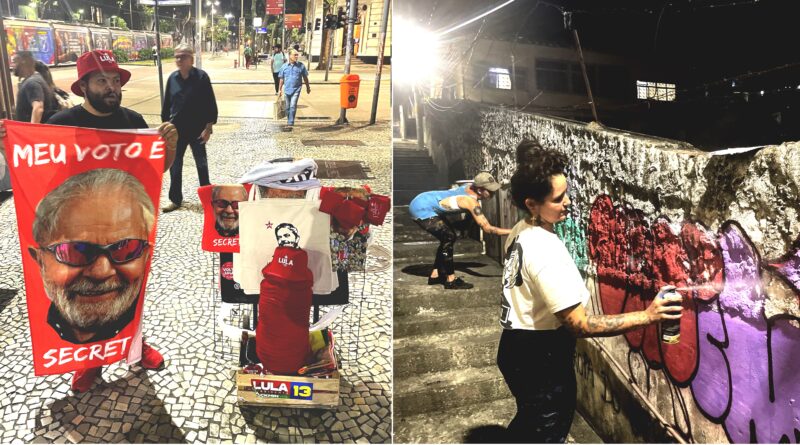Brazil: More Fascism and Neocolonialism or a Path Back to Self-Determination?
Danny Shaw
Río de Janeiro
(The author has changed certain names and details to protect individuals’ privacy.)
When you arrive in another country, there is nothing more precious than new friends who adopt you, protect you, and teach you about their language, music, culture, and traditions. For an open-minded traveler, ethnographer and anti-imperialist organizer, this new family is more valuable than any air-conditioned hotel, amount of comfort or money.
When I moved to Brazil in May of 2003, Binho, Mateuszinho, Thiago and their family and neighborhood crew took me in and put me up in O Morro do Santo Cristo and O Complexo da Penha, the heart of Río de Janeiro’s favelas and drug war. They walked me through the complex landscape of Rio’s corrupt brutal police who shoot first and rarely ask questions later, their violent blitzes (Río slang for stop and frisks), and a maze of morros (ghettos spread across hills) divided between two major paramilitary drug gangs: O Comando Vermelho and O Terceiro Comando (The Red Command and The Third Command).
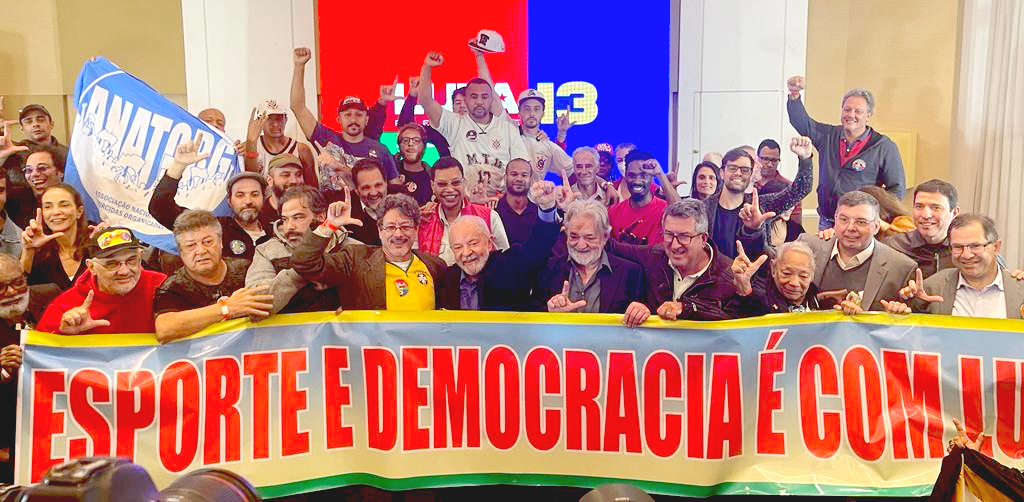
On the eve of what Steve Bannon is calling the “second most important election in the world,” the October 2nd showdown between Luiz Inácio Lula da Silva and Jair Bolsonaro, I returned to Río nineteen years later.[1] Full of saudades (memories or nostalgia), I surprised the old crew in hopes of getting us all back together.
Everyday Survival
What became of my three friends?
From the outset, it is important to steer the English-speaking reader away from the stereotype that Rio de Janeiro represents Brazil or that my organic contacts represent all of Rio. Only a tiny percentage of favela residents make a living in the drug trade while most families reject lumpen lifestyles and find ways to eke out an income in hostile economic terrain by any means necessary.
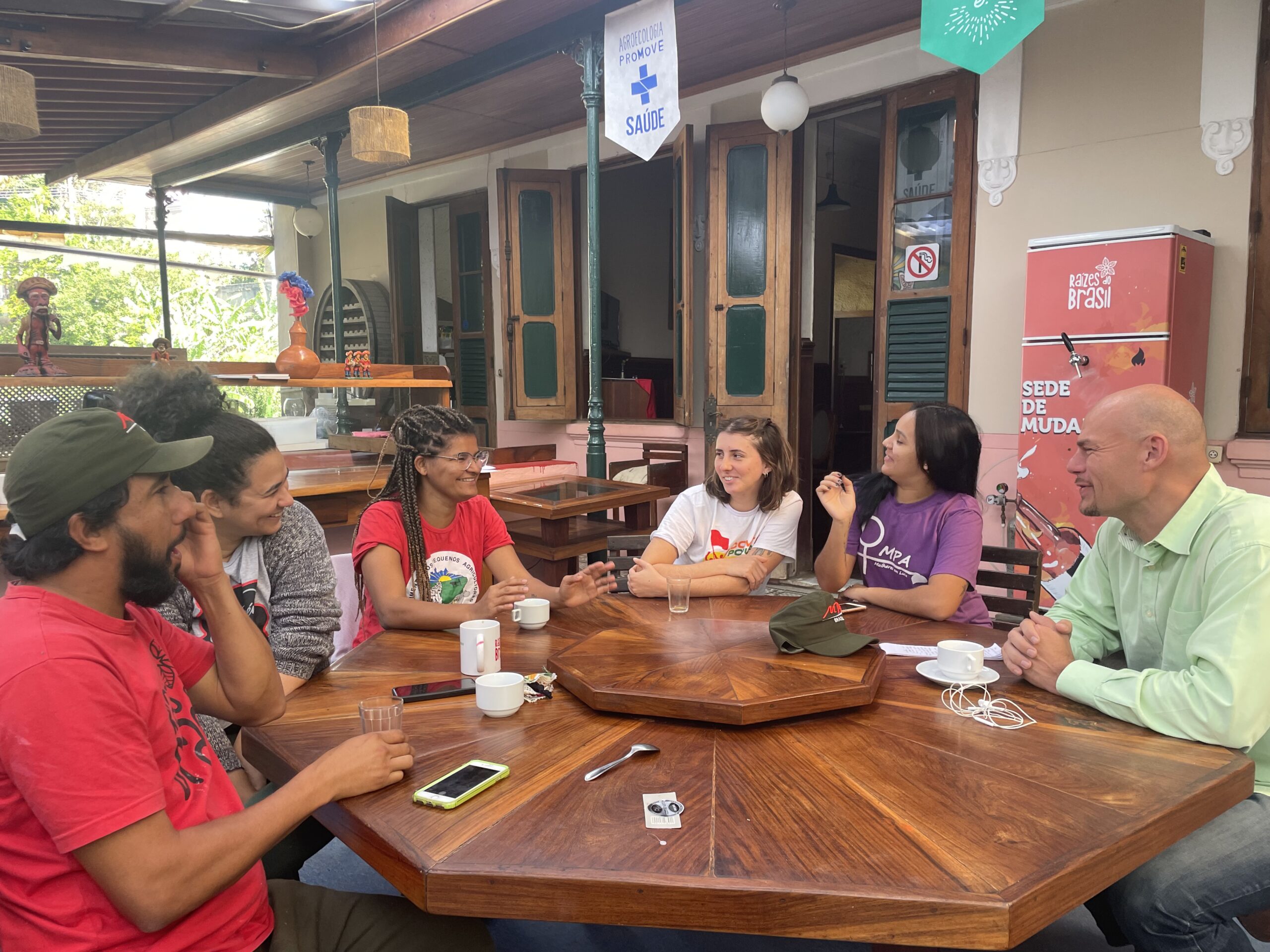
Binho went to prison in 2004 for an armed robbery of a bakery that left his three partners in crime dead in a shootout with the police in Jacarepaguá. A police officer who responded to the scene said he didn’t pull the trigger because Binho’s face reminded him of his son. The crime of armed robbery, Article 157 of the penal code, afforded Binho four years in Bangu prison. The vibrant 22-year old sustained brain injuries and psychological trauma from beatings from rival gangs. He contracted AIDS and has not been able to access the necessary medications. His wife Ronenete died of AIDS complications four years ago. I sat by his bedside remembering old times, nostalgic of the once cocky, invincible bandido (thug) who mentored me on why in Rio, “você não pode vacilar” (you can’t get caught slipping.)
Mateuszinho was a low level hustler for the Comando Vermelho, Rio’s largest gang and drug trafficking entity. He was a quick-talking, street smart 24-year old who conversed his way out of every brush with death, laughing it off and embarking upon his next mission. For seven 12-hour shifts per week as a vapor (the highest look out at the top of the morro), he earned $60 (120 reais in 2003) per week. I remember him parading around with other teenagers and young men toting M-16s and other automatic weapons as they protected the open drug operations and patrolled a baile funk, a weekend block party attended by thousands of local residents. With the police in plain view, the CV soldiers fired their weapons into the air in an open show of force sometime after 2 A.M., yelling their signature slogan “É nós.” I tracked down Mateuszinho at the science museum (Museu do Amanhá) where he now works as head of security. He is now one of over 65 million Brazilians, in an Evangelical church, the fastest growing religion in Brazil, second only to the Catholic Church with 105 million members.[2]
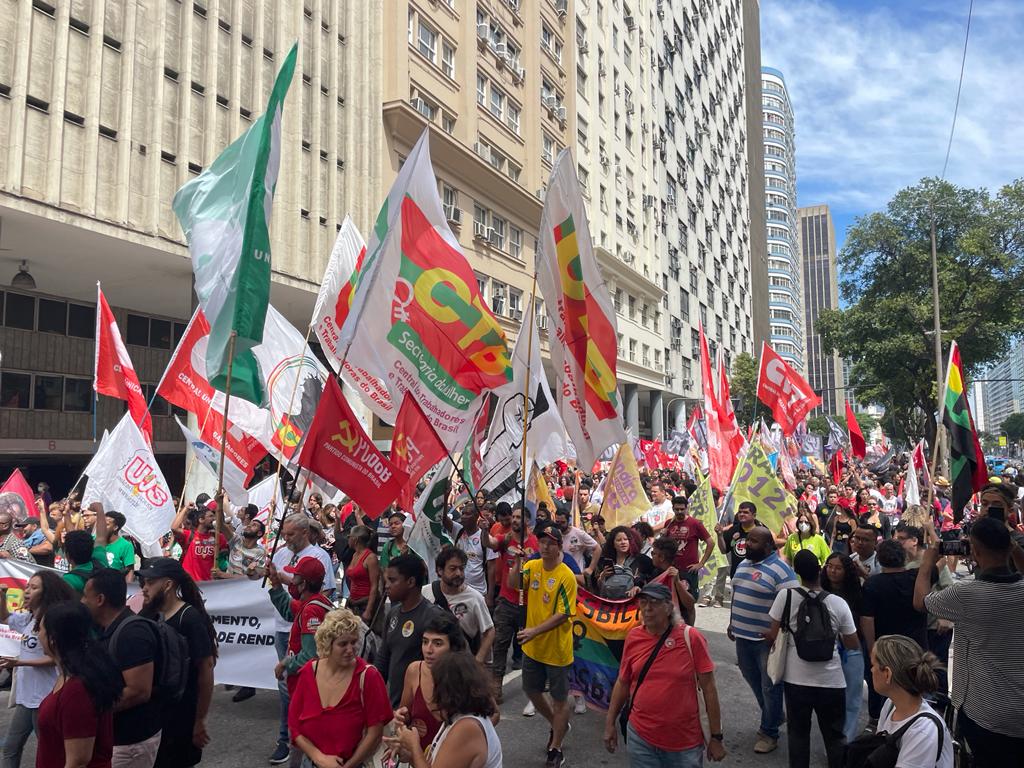
Rene continues to coordinate Arte Transformadora which serves 476 youth from O Complexo da Penha, 13 favelas spread over 13 hills where landless families first eeked out an existence when slavery was officially “abolished” in 1888.[3] Brazil was the last nation on earth to officially outlaw slavery. Deprived of forty acres and a mule or any type of support or reperations from the state, millions of newly “freed” slaves were left to fend for themselves in a caste society regimented by race and class. Favelas, named after a type of tree native to the Northeast, home to many slaves and migrant laborers who headed South, emerged as the name of these hilltop shantytowns. Rene matter-of-factly talked about identifying and delivering the bodies of youth soldiers of the Comando Vermelho to their families after they were shot down by the UPP (Police Pacifying Unit). Often, the police only allowed him or another community leader to cross police lines to retrieve the bodies. Rene still jokes with hustlers armed with walkie talkies and automatic weapons, children he held in his own arms only a decade before. Arte Transformadora seeks to plant seeds of hope and success in the minds of preteens and teens who may otherwise become cannon fodder for Rio’s drug war.
Visiting these close friends nearly two decades later gave me deeper insight into the two different directions this South American economic juggernaut might take on October 2nd.
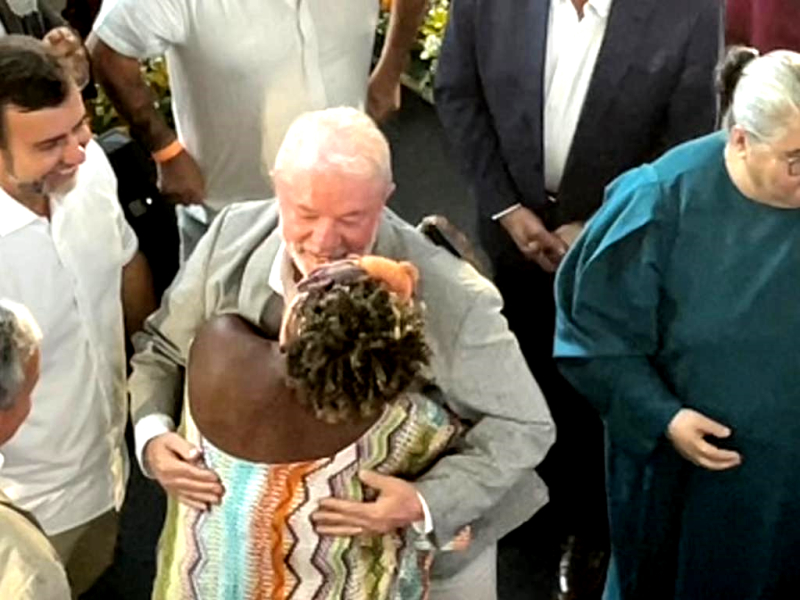
The Showdown
156,454,011 Brazilians are eligible to vote next week for the president, 27 governors, 27 senators, 513 Congress people, 1,035 state representatives, and 24 district representatives. 28,274 candidates are squaring off for these positions, representing a vast array of parties, ranging from socialist to far-right.[4]
Jair Bolsonaro is the incumbent president who won the 2018 presidential election over the Partido dos Trabalhadores’ (PT) Fernando Haddad, due largely to the lawfair and misinformation campaign that had been underway against the PT since it first won executive power in 2003. Bolsonaro has employed Trump-esque tactics, preemptively questioning the integrity of the voting machines. Netlab, a unit at the Federal University of Rio de Janeiro,[5] found that YouTube was favoring algorithms that promoted these Bolsonaro myths. Bolsonaro and his fellow senators have a history of denigrating and intimidating journalists.[6] As the presidential campaigns began to heat up, this former Army Artillery Officer is actively trying to get the military further involved in politics[7] and positioned to overturn the decisions of the Electoral Commission[8] to verify the elections if he were to lose. Some analysts are contemplating whether his camp has the power to stage an October coup.[9] More recently, however, Bolsonaro has tried to strike a more conciliatory tone saying “If it’s God’s will, I’ll continue (as president). If not, I’ll pass the (presidential) sash and retire.”[10]
For the past two weeks Globo, CNN Brasil and the other mouthpieces of the economic and political establishment have published headlines stating that Datafolha polls give Lula 45% of the vote and Bolsonaro 33%.[11] A student of Trumpian tactics, Bolsonaro has for the past four years positioned himself as the victim of “the liberal media” and “fake news.”[12] A military insider and political “outsider,” Bolsonaro has more recently made a list ditch effort to implement populist economic measures to shore up more votes, approving a $7.7 billion dollar stimulus package, which increases cash handouts to struggling families by 50%. According to the same Brazilian study, 61 percent of voters view this eleventh hour move as politically motivated to cut Lula’s lead in the polls.[13]
Datafolha’s research lays out the demographics of Brazil’s divided vote:
50 percent of women are expected to vote for Lula and 27 percent for Bolsonaro. Young people, aged 16 to 24, are twice as likely to vote for Lula. The demographic least likely to vote for Bolsonaro is Black women. Afro-Brazilians in general, and families making less than twice the minimum wage (which is roughly 55 percent of the electorate), are less likely to vote for him. Bolsonaro is leading among white males; and among families making over five times the minimum wage, he polls at 47% to Lula’s 35%.[14]
According to another Datafolha study, Lula maintains 53 percent of the Catholic vote versus Bolsonaro’s 30 percent.[15] In the case of other religions — such as the Afro-Brazilian candomblé, the PT candidate is polling four times higher than his Liberal Party rival. Lula has a comfortable lead among self-defined atheists, with 60 percent expected to vote for him and 22 percent for the incumbent. Among Evangelical Christians, Bolsonaro’s main base, he is polling at 52 percent. Bolsonaro’s appeal to this sector comes from the fact that he “promotes conservative family values and opposes abortion and same-sex marriage.”[16] The fact that 34 percent of the people in Bolsonaro’s key demographic now say they will vote for Lula is immensely significant. On September 9th, Lula met with members of the Evangelical Church of São Gonçalo on the outskirts of Río and in an emotional appeal laid out why he is the real candidate for those who believe in God and in justice.[17]
The attempt to build a popular anti-fascist front with more right-leaning and center candidates led Lula to select former São Paulo governor Geraldo Alckman as his running mate. Professor Luis Mergulhāo elucidates why many on the left find Alckman objectionable.[18] Regardless of these valid critiques, seven former Brazilian presidential candidates have come out in support of Lula. His ability to build the largest electoral alliance in the six times he has run for president shows that Lula is an astute political strategist.[19]
There are other exciting historic races under way as well. Though beyond the scope of this article, it is worth highlighting one such race. Black City Councilwoman Carol Dartora is running under the slogan “Paraná is also ours.”[20] Dartora managed to push through Affirmative Action legislation in the southern Curitiba city government even though 70% of the council men and women were right wing, representing the racist politics that have long dominated the region. She joined Lula at a massive campaign rally on September 18th showing that Brazil’s three Southern states, Paraná, Santa Catarina and Rio Grande do Sul, which are a majority European descendent, also have a strong PT base.[21]
The Lula and Dilma PT Years: Social base and sister organizations
Brasilwire, a website that closely follows the twists and turns of Brazilian politics through an anti-imperialist lens, offers an overview of the anti-neo-liberal track record of the PT. Between 2003 and the Lawfare coup against President Dilma Rousseff in 2016, the PT helped lift 40 million Brazilians out of poverty,[22] expanded university access for working class and Afro-Brazilian students, granted labor rights to Brazil’s long exploited domestic servants,[23] and stimulated internal production and created a market for nationally manufactured goods.[24] Lula speaks the language of the masses of Brazil, challenging the arrogance and invincibility of the other candidates who represent Brazil’s 0.1 percent. On Sunday, August 27th, in the first nationally televised presidential debate, he stood up to the other candidates who challenged his executive track record, saying “You may not have seen the changes we (the PT) carried out, but your gardeners, your drivers, your bodyguards, and your maids did.”[25] Millions erupted into applause as their Lula spoke truth to power.
Lula’s social welfare programs did not always bring about structural change, but they did lift millions of Brazilians out of poverty. One of Lula’s stated goals, which he speaks about on the campaign trail, is to ensure every Brazilian is able to eat three meals a day. The PT democratized higher education. According to a World Bank study, in 2002, there were zero students from the poorest 20 percent of the population attending college and only 4 percent of college students came from the poorest 40 percent.[26] Two-and-a-half terms of PT leadership changed this dramatically. By 2015, approximately 15 percent of higher education students were from the two poorest quintile of Brazilian society. For the first time, working-class and Black Brazilians could get that critical university education.
To further understand the PT’s defense of the poor, we must look at its base and its sister organizations and the work that they do on the frontlines of the class struggle. The true working class base of the PT is the Central Única dos Trabalhadores (CUT).[27] The largest union in South America and fifth largest in the world, the CUT has 7,847,077 dues-paying members and 23,981,044 associated union members.[28] 48 CUT leaders, representing a vast array of trades from public workers to professors, are running in the current elections. Citing the 1988 Brazilian constitution, the CUT writes: “Article number 1 states all power emanates from the people who exercise it through elected representatives or directly in the terms of this constitution.”[29] The Ibitinga, São Paulo-based teacher and CUT Secretary of Administration and Treasury, Ariovaldo de Camargo,[30] lays out a class-based view of these elections: “Bosses pick bosses. Workers vote for workers. We have a wide array of workers before us to vote for.”[31]
The Movement of Landless Workers, the MST, works closely with the PT and other leftist parties. Since the 1980’s, the MST has mobilized some 370,000 families to carry out 2,500 collective land occupations against latifundios (massive estates held by individuals or corporations).[32] Despite constant threats and attacks from the Military Police, the largest social movement in the history of the hemisphere has liberated 7.5 million hectares of land and set in motion critical education programs, increased agricultural production, cooperatives, and quality health care.
The National Movement for Struggle for Housing, The MNLM, builds “solidarity in urban spaces, in a unique, organic relationship with the MST. Beyond land, we fight for housing lots, homes, sanitation and the other needs of marginalized populations.”[33] This organization of “squatters” has appropriated homes for thousands of families and set up collectived educational centers and child care.
Victories by the PT, the Party for Socialism and Liberty (Psol), and the Communist Party of Brazil (PCdoB) would keep space open for such redistribution and reparations to continue. A Bolsonaro victory would heighten the intensity of violence against society’s most vulnerable social actors and social movements.
Implications for Brazil’s foreign policy
The Bolsonaro administration has been a firm ally in Washington’s drive against left and left-leaning governments in Latin America, and has distanced Brazil from the cause of regional integration. In stark contrast, a third Lula administration would once again make Brazil a champion of regional independence and integration by playing an active role in the Community of Latin American and Caribbean States (CELAC) which Brazil left in 2020, and the Union of South American Nations (UNASUR) which Brazil left in 2019. Lula would also be a strong advocate for Bolivia’s full membership in the Southern Common Market (MERCOSUR). And just as Colombian President Gustavo Petro has made amends with the Chavista government of Venezuela, if elected, Lula would cease all hostilities and embrace a cooperative relationship with the Bolivarian Republic. Brazil would play a stronger role in BRICS and the building of a multipolar world. During his presidency, Lula served as an international peace maker trying to help negotiate a “nuclear deal” between the United States and Iran; if elected, he would likely resume efforts to advance world peace.[34]
Lula’s foreign policy will represent the reintegration of Brazil into the Bolivarian family and further momentum for the progressive transformations underway across the continent from Cochabamba to Caracas to Mexico C/ity.[35] Lula has spoken of building a unifying South American currency, the Sur. At a campaign rally, Lula remembered: “The US was very afraid when I discussed a new currency and Obama called me: ‘Are you trying to create a new currency, a new euro?’. I said, ‘No, I’m just trying to get rid of the US dollar. I’m just trying not to be dependent.’”[36]
Despite such massive gains against an entrenched economic and political elite, segments of the U.S. “left” have been very critical of the PT.[37] Though the PT has been subject to legitimate critique, Brazil Wire documented how Jacobin, a magazine affiliated with the Democratic Socialists of America, published 38 articles on Brazil from 2014-2017. All 38 presented a negative view of the PT. A far cry from the more radical policies of other Pink Tide presidents like Hugo Chavez or Fidel Castro, most of the left in Brazil today is united behind electing Lula and other progressive candidates as the next step towards challenging Brazil’s status as a neo colony of the West. Up against such a formidable proto-fascist foe, how important is it for the U.S. left to stand with those most under attack?
Bolsonarismo: the Militarization of Brazilian Society
For a country that lived through a two-decade-long military dictatorship from 1964-1984, the specter of the return to a police state is real. The newspaper A Nova Democracia conducted a study of “The Super-Salaries of the Generals” that Bolsonaro has worked alongside, inherited, appointed, and promoted.[38] According to author Gabriel dos Santos, 215 Military Officers receive monthly salaries of R$32,153,77, 30 times more than the minimum wage in Brazil. Other generals such as Vice-president Hamilton Mourão, Augusto Heleno, and former Defense Minister and currentVice-presidential candidate, Walter Souza Braga Netto, have received phantom titles as 4-star marechais (marshalls) and earn a whopping 111.2 thousand reais per month, about 100 times what an everyday worker earns. Bragga gained notoriety when he coordinated the 2014 military occupation of Complexo da Maré, a series of oppressed communities with a population of over 130,000 in the North Zone of the city of Río de Janeiro.[39]
Many of these generals oversaw the 2003-2018 United Nations’ Stabilization Mission in Haiti (MINUSTAH). 30,000 Brazilian soldiers, led by generals who today occupy high-ranking positions in Bolsonaro’s cabinet, occupied Haiti and contributed to massacres in Cite Soleil, Fort National, and Belè.[40] These same generals returned to play a role in the occupation of Rochinha and other favelas to conduct “a War on Drugs” that reached its zenith with 1,814 official police killings in Rio in 2019.[41]
Scholar Thiago Sardinha, a specialist on paramilitary groups across Brazil, highlights the training Brazilian military and paramilitary groups have received from both France and the United States.[42] Used for U.S. interventions in Haiti and Central America, the Agency for International Development (AID) has a special department called The Office of Public Security.[43] In Brazil this office is in charge of training foreign police. Sardinha identifies the reign of terror of both the offical police in São Paulo, Goias and beyond, and the role of paramilitary, extra-official militias which control and collect taxes in many Rio communities.
Bolsonaro’s rhetoric has led the New York Times to lead with the following headline: The Question Menacing Brazil’s Elections: Coup or No Coup?[44] The president’s camp recently met with Steve Bannon, who repeated the same unproven claims that “Bolsonaro will win unless it is stolen by, guess what, the machines.”[45] Jason Miller, a Senior Trump Strategist, spoke at Brazil’s bicentennial independence day.[46] Bolsonaro, amidst a sea of yellow and green Brazilian flags, turned “the independence day celebrations” in Copacabana, Brazilia, and throughout the country into campaign rallies. He is now under investigation for illegally combining these two events.

Professor Danny Shaw at Arte Transformadora in Rio de Janeiro, Brazil, teaching a boxing workshop (photo credit: Danny Shaw).
Bolsonarismo: Polarization and the Open Veins of Brazil
FAIR published a scathing critique of a new documentary BBC and PBS released two weeks before the election which present Bolsonaro as a heroic rags to riches story.[47] While the liberal media has traditionally been at odds with the Trumps, Dutertes, and Bolsonaro, why would the Tories ofEngland and sectors of the U.S. ruling class, particularly business interests, so openly embrace such an odious, graceless figure like Bolsonaro?
From the perspective of foreign capital Bolsonaro represents unfettered access to the open veins of Brazil, the world’s tenth largest economy with a GDP of 1.8 trillion dollars.[48] Bolsonaros’s party is called the Liberal Party and the Minister of Economy is Paulo Geudes, who was trained in a PhD program at the University of Chicago under Milton Friedman in the 1970s. Because Lula, Dilma, and the PT would not go along with the Washington consensus, they had to be removed from power and, in the case of Lula, imprisoned. Lula was cleared of all 26 of the bogus charges.[49]
The showdown between a former union leader who lost a finger in a São Paulo factory and a career military man who emerged as the mouthpiece of Brazil’s economic and military elites speaks to the deep divisions in Brazilian society.
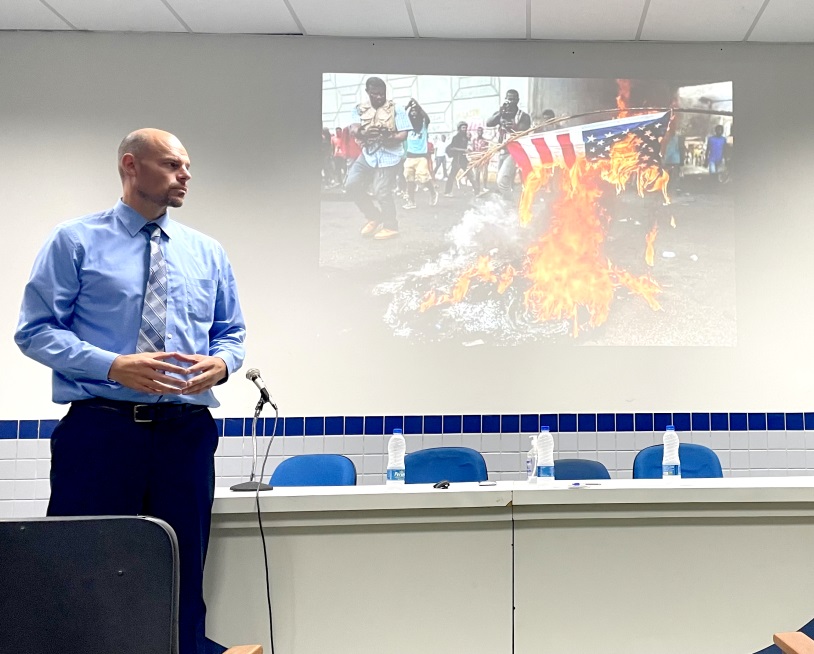
The Brazilian Senate approved a 1,100 page report evaluating Bolsonaro’s denial of the COVID-19 pandemic and his disastrous handling of it.[50] Brazil has had the most deaths from COVID, 685,422 in total, after the United States.[51] Despite his disastrous handling of the COVID-19 epidemic, Bolsonarismo has a strong social base. Even a robust win for the PT will not make this base go away overnight. Centuries of white supremacy and class rule have segregated Brazilian society along class, racial, and gender lines.
Black Brazilians continue to face an epidemic of police violence and systemic discrimination. Journalist Jean Wyllys, Brazil’s second openly gay member of parliament and first gay-rights activist congressman, and translator and activist Julie Wark, summarize the struggles of Black and indigenous Brazilians: “The human and physical destructiveness of capitalism, a system in which pretos (Blacks), whose slave labour was essential toits construction, are very far from the spheres of power, wealth, and decision-making. Rather, they are under the yoke and marginalized. In Brazil, Blacks account for 75.2 percent of the population in the lowest income group whereas 25.4 percent of the general population lives in poverty; A Black person earns only 56.1 cents for every dollar a white person earns; 32.9% of Black people live below the poverty line ($5.50 per day); while 8.8 percent live in extreme poverty ($1.90 per day).”[52]
Anti-racist organizers in the U.S. can relate to the situation in Brazil. Just in 2019, Bolsanoro’s first year of governance, 31 activists were murdered for defending their land.[53] There were no convictions against any of the assassins. This is similar to what The Boston Globe calls “vehicle ramming” against Black Lives Matter protestors (The Globe has investigated 139 such hate crimes in the U.S. since the murder of George Floyd).
On September 8th, a Bolsominion, the slang name for Bolsonaro’s supporters, murdered a Lula supporter after a disagreement overpolitics.[54] These incidents have become more and more common. On September 17th, a group called the “Communist Hunters” warned the PT’s Minas Gerais state lawmaker Andréia de Jesus: “We are going to shoot you in the back like a traitor, Marielle (Franco) awaits you. Viva Ustra.”[55]
Recovery, Redemption, and Reparations: Which Way Forward?
I will forever be grateful to Binho, Mateuszinho, and Rene. My dozens of pages of quickly scribbled notes in my pocket notebooks speak to what they taught me. “As viagems formam a juventude,” (Travelling helps define our youth). My greatest tribute to them is helping fight for a world that does not confine our children from O Complexo do Alemão to the Bronx to a suffocating everyday rat-race battle for survival and a shred of dignity.
In his legendary essay, “Fifth Avenue, Uptown,” James Baldwin wrote “A ghetto can be improved in one way only: out of existence.”[56] Capitalism and white supremacy and their inevitable bastard offspring – generational trauma, gangs, drugs, misogyny, prison, and a long list of social ills – guarantee more human suffering and humiliation. Brazil suffers from a crack epidemic and alcoholism that has shattered hundreds of thousands of families. Bolsonarismo deploys rhetoric that enables the most retrograde actors a free reign to enact more violence upon women, the LGBT community, Black Brazilians, and Indigenous communities. What we are witnessing in Brazil is late neocolonialism’s desperate attempts to divide society and scapegoat the most oppressed layers so that society’s overlords can save their own skin.
While Río de Janeiro is but one small piece of the fabric of a diverse society of 210 million people spread across the world’s most diverse lands in terms of fauna, flora, and animal species, these human stories are a microcosm of the lives and struggles of how many millions of working-class Brazilians?[57]
Every victory for the Partido dos Trabalhadores, and other progressive parties like the PCdoB and the Psol at the local, state, and federal level–and chiefly, of course, for Lula at the presidential level–brings Brazil and this generation of fighters that much closer to realizing Baldwin’s dream.
Danny Shaw is Senior Research Fellow at COHA and an academic at City University of New York.
Fred Mills, COHA’s Deputy Director, and Jill Clark-Gollub, COHA Assistant Editor/Translator, edited this essay.
Sources
[1] Estrategista de Trump, Steve Bannon ecoa Bolsonaro em mentiras sobre urnas eletrônicas”, https://www.youtube.com/watch?v=D_3WSn7jOfo
[2] “Why Brazil’s Bolsonaro is courting evangelicals in the world’s biggest Catholic nation”,
https://www.wlrn.org/news/2022-08-25/why-brazils-bolsonaro-is-courting-evangelicals-in-the-worlds-biggest-catholic-nation
[3] Artetransformadora”, https://www.instagram.com/artetransformadora/
[4] “Eleição este ano terá mais de 28 mil candidatos; veja os números”, https://www12.senado.leg.br/noticias/materias/2022/08/16/eleicao-este-ano-tera-mais-de-28-mil-candidatos-veja-os-numeros
[5] “YouTube Pushing Pro-Bolsonaro Content To Brazilians, Study Finds”, https://www.brasilwire.com/googles-youtube-platform-pushing-pro-bolsonaro-content-to-brazilians-finds-study/
[6] TelesurEnglish https://twitter.com/telesurenglish/status/1570236758725480448?s=20&t=uq6NpfuhlvfFuhu1dyBo9g
[7] “Eleições. Militares poderão colocar Justiça Eleitoral sob suspeita”, https://noticias.uol.com.br/colunas/walter-maierovitch/2022/09/15/eleicao-militares-poderao-colocar-justica-eleitoral-sob-suspeita.htm
[8] “Brazil Military’s “Parallel Vote Count” Poses Great Risk To Democracy”, https://www.brasilwire.com/militarys-parallel-vote-count-poses-great-risk-to-democracy/
[9] https://twitter.com/BrianMteleSUR/status/1570114278933274628?s=20&t=uq6NpfuhlvfFuhu1dyBo9g
[10] “Brazil’s Bolsonaro says he will retire if he loses October vote”,
https://www.france24.com/en/live-news/20220913-brazil-s-bolsonaro-says-he-will-retire-if-he-loses-october-vote
[11] “Pesquisa Datafolha para presidente: Lula tem 45%; e Bolsonaro, 33%”, https://www.cnnbrasil.com.br/politica/pesquisa-datafolha-para-presidente-lula-tem-45-e-bolsonaro-33/
[12] “Mentiras sobre Bolsonaro mostram que ninguém está livre das fake news”, https://www.metropoles.com/brasil/mentiras-sobre-bolsonaro-mostram-que-ninguem-esta-livre-das-fake-news
[13] “Voters see through Bolsonaro’s Economic Populism, Poll Says”, https://brazilian.report/liveblog/2022/08/04/voters-bolsonaro-economic-populism/
[14] https://especiaisg1.globo/politica/eleicoes/2022/pesquisas-eleitorais/presidente/1-turno/
[15] “Datafolha: Lula reage entre evangélicos, e vantagem de Bolsonaro recua sete pontos”, https://extra.globo.com/noticias/politica/datafolha-lula-reage-entre-evangelicos-vantagem-de-bolsonaro-recua-sete-pontos-25573698.html
[16] “Why Brazil’s Bolsonaro is courting evangelicals in the world’s biggest Catholic nation”, https://www.wlrn.org/news/2022-08-25/why-brazils-bolsonaro-is-courting-evangelicals-in-the-worlds-biggest-catholic-nation
[17] https://twitter.com/J_LIVRES/status/1568257757370802177?s=20&t=I8QIFmdMpf3WaZg4XQTdQg
[18] https://www.instagram.com/reel/Ch7oWESJKm0/?igshid=ZjA0NjI3M2I=
[19]https://twitter.com/telesurenglish/status/1571928719186444289?s=20&t=te58T16ttZSnTCZbl89POg
[20] https://twitter.com/caroldartora13
[21]https://twitter.com/caroldartora13/status/1571508059423350787?s=20&t=te58T16ttZSnTCZbl89POg
[22] Cerca de 40 milhoes de pessoas ingressaram na classe aponta pesquisa”, https://oglobo.globo.com/economia/cerca-de-40-milhoes-de-pessoas-ingressaram-na-classe-aponta-pesquisa-da-fgv-2756988
[23] “Dilma assina regulamentação dos direitos das domésticas, diz Planalto”, https://g1.globo.com/politica/noticia/2015/06/dilma-assina-regulamentacao-dos-direitos-das-domesticas-diz-planalto.html
[24] “Impactos da Redução do Imposto sobre Produtos Industrializados (IPI) de Automóveis”, https://www.ipea.gov.br/portal/images/stories/PDFs/2009_nt015_agosto_dimac.pdf
[25] https://twitter.com/dannyshawcuny/status/1564420901491261441?s=20&t=te58T16ttZSnTCZbl89POg
[26] “The Persistence of Inequity in Brazilian Higher Education: Background Data and Student Performance”, https://link.springer.com/chapter/10.1007/978-3-030-69691-7_4
[27] https://www.cut.org.br/conteudo/breve-historico
[28] https://www.cut.org.br/conteudo/breve-historico
[29] “Para lutar por direitos sociais e trabalhistas, CUT lança 49 candidatos no país”, https://www.cut.org.br/noticias/para-lutar-por-direitos-sociais-e-trabalhistas-cut-lanca-48-candidatos-no-pais-54a2
[30] https://www.cut.org.br/biografia/ariovaldo-de-camargo
[31] “Para lutar por direitos sociais e trabalhistas, CUT lança 49 candidatos no país”, https://www.cut.org.br/noticias/para-lutar-por-direitos-sociais-e-trabalhistas-cut-lanca-48-candidatos-no-pais-54a2
[32] “What is the MST?”, https://www.mstbrazil.org/content/what-mst
[33] https://www.google.com/url?q=https://library.oapen.org/bitstream/handle/20.500.12657/48463/1/external_content.pdf&sa=D&source=docs&ust=1664051335228237&usg=AOvVaw2szPCvepnWjzRovz1S2jMu
[34] “The Most Important Election in the Americas is in Brazil’, https://www.counterpunch.org/2022/09/01/the-most-important-election-in-the-americas-is-in-brazil/
[35] https://twitter.com/dannyshawcuny/status/1565127955033907200?s=20&t=te58T16ttZSnTCZbl89POg
[36] https://twitter.com/dannyshawcuny/status/1561056783191265280?s=20&t=te58T16ttZSnTCZbl89POg
[37] “How The US Left Failed Brasil”, https://www.brasilwire.com/how-the-us-left-failed-brasil/
[38] Dos Santos, Garbrel. December 2021.
[39] “Braga Netto, o general que Bolsonaro escolheu como candidato a vice”, https://www.infomoney.com.br/perfil/walter-braga-netto/
[40] “10 Reasons Why UN Occupation of Haiti Must End”, https://haitiliberte.com/10-reasons-why-un-occupation-of-haiti-must-end/
[41] “Number of deaths caused by police intervention in the state of Rio de Janeiro, Brazil from 2003 to 2021”, https://www.statista.com/statistics/1007090/number-deaths-police-intervention-rio-brazil/
[42] https://revistaopera.com.br/2021/05/07/imperialismo-e-grupos-armados-no-brasil/
[43] https://revistaopera.com.br/2021/05/07/imperialismo-e-grupos-armados-no-brasil/
[44] “The Question Menacing Brazil’s Elections: Coup or No Coup?”, https://www.nytimes.com/2022/08/22/world/americas/brazil-election-bolsonaro-coup.html
[45] https://twitter.com/dannyshawcuny/status/1561319122503213057?s=20&t=te58T16ttZSnTCZbl89POg
[46] https://twitter.com/dannyshawcuny/status/1567614197667864576?s=20&t=I8QIFmdMpf3WaZg4XQTdQg
[47] “PBS and BBC Team Up to Misinform About Brazil’s Bolsonaro”, https://fair.org/home/pbs-and-bbc-team-up-to-misinform-about-brazils-bolsonaro/
[48] “The World’s Largest Economies, 2022”, https://ceoworld.biz/2022/09/05/the-worlds-largest-economies-2022/
[49] https://twitter.com/BrianMteleSUR/status/1559211263074385921?s=20&t=te58T16ttZSnTCZbl89POg
[50] “The Toll of Bolsonaro’s Disastrous Covid-19 Response”, https://www.hrw.org/news/2021/10/27/toll-bolsonaros-disastrous-covid-19-response
[51] https://www.worldometers.info/coronavirus/countries-where-coronavirus-has-spread/
[52] “Brazil, Amazon, World: Being Black”, https://www.counterpunch.org/2022/07/21/brazil-amazon-world-being-black/
[53] “Zero convictions as impunity blocks justice for victims of Brazil’s rural violence”, https://news.mongabay.com/2021/02/zero-convictions-as-impunity-blocks-justice-for-victims-of-brazils-rural-violence/
[54] “Apoiador de Bolsonaro mata defensor de Lula a facadas em MT após discussão”, https://www.cartacapital.com.br/politica/apoiador-de-bolsonaro-mata-defensor-de-lula-a-facadas-em-mt-apos-discussao/
[55] https://twitter.com/BrianMteleSUR/status/1571140932136996864?s=20&t=uq6NpfuhlvfFuhu1dyBo9g
[56] “Fifth Avenue, Uptown”, https://www.esquire.com/news-politics/a3638/fifth-avenue-uptown/
[57] “Brasil is not Rio”, https://www.brasilwire.com/brasil-is-not-rio/

